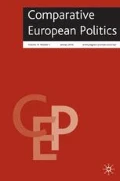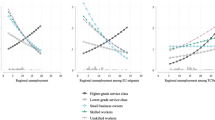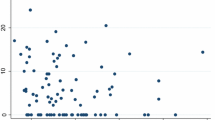Abstract
A new family of political parties has emerged in Europe, emphasizing the need for a radical change in immigration policy. Their success has been accounted by various hypotheses. One hypothesis is that they appeal to marginalized voters, or more specifically, to unemployed voters, losers of modernization. Joblessness also has a connection to voters’ discontent with immigrants. The argument is that immigrants take jobs from native voters. Altogether, this sways towards the expectation that unemployment is related to the success of these parties. I question if this is the case in Scandinavia. The empirical evidence presented leads to the opposite conclusion. Low unemployment seems to give fertile soil to the growth of the radical right. When high unemployment is removed from the political agenda, a political space can be opened for questions of immigration, or more generally, issues related to the socio-cultural cleavage.



Similar content being viewed by others
Notes
Thanks to two anonymous referees, and especially one, for constructive comments.
OECD Employment Outlook, June 2001, OECD, 2001, 208.
All statistics regarding unemployment in Denmark, Norway and Sweden are taken from various editions of Nordic Statistical Yearbook, the last one, Nordic Statistical Yearbook, 2005, NORD 2005: 1, Copenhagen: Nordic Council of Ministers.
The 1999 local elections survey pose the question if the respondent has been unemployed in the course of the last three months. 3.1 percent of the potential employed were unemployed compared with 3.7 percent among the Progress Party voters. In MMI's 2001 Exit Poll the question is if the respondent at the moment is unemployed. The share then becomes not higher than 1.7 percent as 3.5 percent among Progress Party voters. In two other parties, there is also an overrepresentation of unemployed in the Exit Polls, Socialist Left and Red Electoral Alliance. One similarity between these three parties is that they all recruit well among the youth who is especially vulnerable for unemployment.
The analysis is based on the county elections in 1987, 1995, 2003 and the 1997, 2005 parliamentary elections.
References
Betz, H.G. (1994) Radical Right-Wing Populism in Western Europe, London: Macmillan.
Beyme, K.von (1988) ‘Right-wing extremism in post-war Europe’, West European Politics 11: 1–18.
Bjøl, E. (1979) Vor tids kulturhistorie, bind 3 Vore dage, København: Politikens forlag.
Bjørklund, T. (1992) ‘Unemployment and party choice in Norway’, Scandinavian Political Studies 15: 329–352.
Bjørklund, T. and Goul Andersen, J. (2002) ‘Anti-Immigration Parties in Denmark and Norway: The Progress Parties and the Danish People's Party’, in M. Schain, A. Zolberg and P. Hossay (eds.) Shadows over Europe: The Development and Impact of the Extreme Right in Western Europe, New York, NY: Palgrave Macmillan.
Bjørklund, T. and Hellevik, O. (1993) ‘Et valg i EF-stridens tegn’, Tidsskrift for samfunnsforskning 34: 433–458.
Borre, O. and Goul Andersen, J. (1997) Voting and Political Attitudes in Denmark, Aarhus: Aarhus University Press.
Eide, T. (1973) Anders Lange på nært hold, Oslo: Eget forlag.
Elder, G.H. (1974) Children of the Great Depression, Chicago: University of Chicago Press.
Givens, T.E. (2002) ‘The Role of Socioeconomic Variables in the Success of Radical Right Parties’, in M. Schain, A. Zolberg and P. Hossay (eds.) Shadows over Europe: The Development and Impact of the Extreme Right in Western Europe, New York, NY: Palgrave Macmillan.
Goul Andersen, J. (2007) ‘Nationalism, New Right, and New Cleavages in Danish Politics. Foreign & Security Policy of the Danish People's Party’, in C.S. Liang (ed.) Europe for the Europeans! The Foreign Policy of Neo-Populist Parties, London: Ashgate, (forthcoming).
Jackman, R.W. and Volpert, K. (1996) ‘Conditions favouring parties of the extreme right in Western Europe’, British Journal of Political Science 26: 501–521.
Kjeldstadli, K. (1994) Et splittet samfunn 1905–35, bind 10 Aschehougs Norges historie, Oslo: Aschehoug.
Knigge, P. (1998) ‘The ecological correlates of right-wing extremism in Western Europe’, European Journal of Political Research 34: 249–279.
Lipset, S.M. (1981) Political Mann. The Social Bases of Politics, (Expanded edn). Baltimore, MD: John Hopkins’ University Press.
Nannestad, P. (1991) Danish Design or British Disease? Danish Economic Crisis Policy 1974–1979 in Comparative Perspective, Aarhus: Aarhus University Press.
Nordic Statistical Yearbook (2005) NORD 2005: 1, Copenhangen: Nordic Council of Ministers.
OECD (2001) Employment Outlook, June 2001, OECD.
Rydgren, J. (2006) From Tax Populism to Ethnic Nationalism. Radical Righ-wing Populism in Sweden, New York and Oxford: Berghahn Books.
Taggart, P. (1996) The New Populism and the New Politics: New protest Parties in Sweden in a Comparative Perspective, Basingstoke: Macmillan.
Valen, H. (1994) ‘Norway: A Storting Election in the Shadow of the EU’, Electoral Studies 13: 169–179.
Valen, H., Aardal, B. and Vogt, G. (1990) Endring og kontinuitet. Stortingsvalget 1989, Sosiale og økonomiske studier 74, Oslo: Statistisk Sentralbyrå.
Visser, W. and Wijnhoven, R. (1990) ‘Politics do matter, but does unemployment? Party strategies, ideological discourse and enduring mass unemployment’, European Journal of Political Research 18: 71–96.
Author information
Authors and Affiliations
Rights and permissions
About this article
Cite this article
Bjørklund, T. Unemployment and the Radical Right in Scandinavia: Beneficial or Non-Beneficial for Electoral Support?. Comp Eur Polit 5, 245–263 (2007). https://doi.org/10.1057/palgrave.cep.6110110
Published:
Issue Date:
DOI: https://doi.org/10.1057/palgrave.cep.6110110




